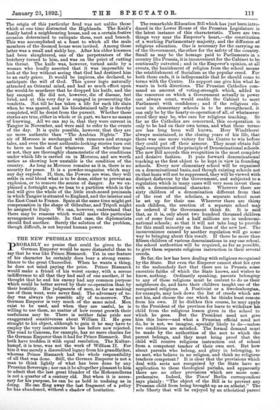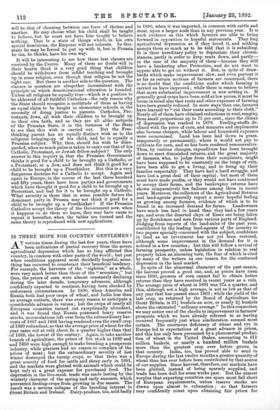. THE NEW PRUSSIAN EDUCATION BILL.
PROBABLY no praise that could be given to the German Emperor would be more distasteful than to say that he was like Prince Bismarck. Yet in one feature of his character he certainly does bear a strong resem- blance to the great Chancellor. When he wants a thing, he does not mind paying the price. Prince Bismarck would make a friend of his worst enemy, with a serene indifference to all that they had said of one another, if he thought that he and his enemy had any common purpose which could be better served by their co-operation than by their hostility. His judgments of men, so far as making use of them went, were never final. The adversary of to- day was always the possible ally of to-morrow. The German Emperor is very much of the same mind. Men exist to be used, and when they are useful, he is willing to use them, no matter of how recent growth their usefulness may be. There is neither false pride nor exaggerated sensitiveness about William II. He goes straight to his object, although to gain it he may have to employ the very instruments he has before now rejected. The road to Canossa, for example, has no more charms for the German Emperor than it had for Prince Bismarck. But both have trodden it with equal resolution. The Kultur- kampf, it is true, was not the work of William II. For him it was merely a discredited legacy from his grandfather, whereas Prince Bismarck had the whole responsibility of all that was done. Still, the German Emperor is not a man to think lightly of what has been done by any Prussian Sovereign ; nor can it be altogether pleasant to him to admit that the last great blunder of the Hohenzollerns is not a quarter of a century old. But when it is neces- sary for his purpose, he can be as bold in undoing as in doing. He can fling away the last fragment of a policy he has abandoned, without a shadow of hesitation. The remarkable Education Bill which has just been intro- duced in the Lower House of the Prussian Legislature is the latest instance of this characteristic. There are two things very near the Emperor's heart,—the constitution of a working Parliamentary majority, and the diffusion of religious education. One is necessary for the carrying on of the Government, the other for the safety of the country. Small as may be the homage paid to Parliaments in a country like Prussia, it is inconvenient for the Cabinet to be continually outvoted ; and in the Emperor's opinion, at all events, the banishment of religion from the school means the establishment of Socialism as the popular creed. For both these ends, it is indispensable that he should come to- terms with the Centre. Its support can give him what he wants in both directions. The Prussian Catholics com- mand an amount of voting-strength which, added to the resources on which a Government actually in power can always count, would enable the Cabinet to meet Parliament with confidence ; and if the religious ele- ment in elementary schools is to be strengthened, it can only be by the hearty co-operation of all, of whatsoever creed they may be, who care for religious teaching. So far as the Catholics are concerned, this co-operation it only to be had on their own terms, and what these terms, are has long been well known, Herr Windthorst always maintained, in the closing years of his life, that there was one more victory for the Centre to win before they could put off their armour. They must obtain full legal recognition of the principle of Denominational schools_ Thenew Bill accords this recognition in the most complete and decisive fashion. It puts forward denominational teaching as the first object to be kept in view in founding schools. Every new elementary school will be organised on a denominational basis, and though existing schools not on that basis will not be suppressed, they will be viewed with. distinct disfavour by the Government, and subjected to.* regulation which in many cases will very soon invest them with a denominational character. Wherever there are sixty children of a denomination different from that of the rest of the scholars, a separate school must be set up for their use. Wherever there are thirty such children, the erection of a separate school may be ordered if the Government think fit. It is said that, as it is, only about two hundred thousand children out of some four and a half millions are in undenomi- national schools ; so that it will not take long to provide for this small minority on the lines of the new law. The inconvenience caused by another regulation will go some way to bringing about this result. If there be more than fifteen children of various denominations in any one school, the school authorities will be required, as far as possible, to give them separate religious instruction in their several creeds.
So far, the law has been dealing with religions recognised by the State. But even the Emperor cannot shut his eyes to the melancholy fact that there are in Prussia some excentric faiths of which the State knows, and wishes to know, nothing. Ordinarily speaking, parents belonging to any of these religions must be content to do as their neighbours do, and have their children taught one of the recognised religions. A Positivist or a Swedenborgian, for example, may look down the list of creeds which are not his, and choose the one which he thinks least remote from his own. If he dislikes this course, he may apply to the President of the province for leave to withdraw his child from the religious lesson given in the school to which he goes. But the President need not give him this leave—and what a Prussian official need not do, he is not, we imagine, specially likely to do—unless two conditions are satisfied. The formal demand must be made by the authorities of the sect to which the parent belongs, and they must bring proof that the child will receive religious instruction out of school from a competent teacher of their own sect. But how about parents who belong, and glory in belonging, to no sect, who believe in no religion, and think no religious teachers competent ? It is clear that the provisions which deal with sects not recognised by the State have no application to these theological pariahs, and apparently there are no other provisions which are more com- prehensive. Indeed, the Times' Berlin correspondent says plainly : " The object of the Bill is to prevent any Prussian child from being brought up as an atheist." The sole liberty that will be enjoyed by an atheistical parent will be that of choosing between one form of theism and another. He may choose what his child shall be taught to believe, but he must not have him taught to 'believe nothing. That is a state of things which, in his own special dominions, the Emperor will not tolerate. In Ger- many he may be forced to put up with it, but in Prussia he can, he thinks, have his own way.
It will be interesting to see how these last clauses are received by the Centre. Many of them no doubt will in their hearts think it a very good thing that children should be withdrawn from infidel teaching and brought -up in some religion, even though that religion be not the right one. But there is another side to the question. The clauses in question are altogether inconsistent with the principle on which denominational education is founded. Unless all religions be equally true—which is a position to be abhorred of all faithful Catholics—the only reason why the State should recognise a multitude of them as having an equal claim to be taught in elementary schools, is the necessity of doing justice to parents. Catholics, Pro- testants, Jews, all wish their children to be brought up in their own faith, and as they are all alike subjects of the Prussian State, it is the business of the State to see that this wish is carried out. But the Free- thinking parent has an equally distinct wish as to the -religious bringing-up of his child, and he is equally a Prussian subject. Why, then, should his wish be disre- garded, when so much pains is taken to carry out that of his Catholic, Protestant, or Jewish fellow-subject ? The only answer to this inquiry is, that the Prussian Government thinks it good for a child to be brought up a Catholic, or a Protestant, or a Jew, and does not think it good for a -child to be brought up a Freethinker. But this is a very -dangerous doctrine for a Catholic to accept. Again and again in Europe, in the course of the last three hundred and fifty years, there have been parties and governments -which have thought it good for a child to be brought up a Protestant, and bad for it to be brought up a Catholic. What security is there that in some possible future the dominant party in Prussia may not think it good for a child to be brought up a Freethinker ? If the Prussian Catholics accept the theory of the Government now, when it happens to do them no harm, they may have cause to repent it hereafter, when the tables are turned and the same theory is reproduced with new applications.



































 Previous page
Previous page